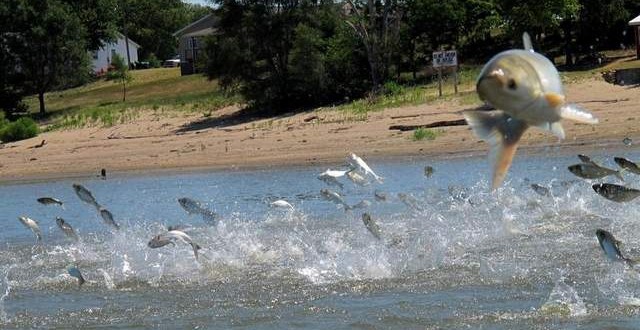Asian carp have yet to establish a presence in the Great Lakes, but scientists have already begun researching the possible effects of an invasion by the non-native species.
In a study recently published in the journal Transactions of the American Fisheries Society, researchers from the National Oceanic and Atmospheric Administration (NOAA) and the University of Michigan state that if Asian carp get into Lake Erie, the fish could eventually account for about a third of the total weight of fish in the lake. This means that plenty of native fish, such as the lakes’ prized walleye and rainbow trout, will see their populations cut significantly.
However, most of the expected declines in Lake Erie will not be as extreme as some experts have predicted, according to the food-web study by the University of Michigan’s Hongyan Zhang and colleagues from other American and Canadian research institutions. A few fish species, including smallmouth bass, would likely increase.
The study is the first to use a food-web model to examine the likely impacts of bighead and silver carp in Lake Erie. These plankton-eating Asian carp are established in watersheds close to the Great Lakes but not in the lakes themselves.
The invasive carp would likely affect Lake Erie’s food web in two main ways: They would likely compete with native fish by eating their food, and juvenile Asian carp would likely become food for fish-eating fish.
According to the study, walleye, rainbow trout, gizzard shad and emerald shiners could all decline, with declines in emerald shiner of up to 37 percent. Smallmouth bass stood to gain the most, with increases of up to 16 percent.
A paper summarizing the findings was published online Dec. 30 in the journal Transactions of the American Fisheries Society.
The model results suggest that Asian carp could eventually account for up to 34 percent of the total fish weight in the lake, said Zhang, assistant research scientist at U-M’s Cooperative Institute for Limnology and Ecosystems Research in the School of Natural Resources and Environment.
“Fortunately, the percentage would not be as high as it is today in the Illinois River, where Asian carp have caused large changes in the ecosystem and have affected human use of the river,” she said.
Previous predictions of Asian carp impacts in the Great Lakes have ranged widely. Some experts say Asian carp could decimate Great Lakes fisheries and food webs, while others suggest the effects would likely be minor because much of the Great Lakes is not a suitable habitat for Asian carp.
Results of the new study fall somewhere between the two extremes.
“This study goes beyond previous efforts in two significant ways. It focuses on the food webs and—where model input data were not available—it includes uncertainty estimates from experts,” said co-author Ed Rutherford, a fisheries biologist at the Great Lakes Environmental Research Laboratory (GLERL) in Ann Arbor, a U.S. National Oceanic and Atmospheric Administration facility.
To include uncertainty in model predictions, team members interviewed 11 leading experts on Asian carp biology and Great Lakes ecology and fisheries, then incorporated the experts’ estimates into the model. The experts were also asked to indicate the level of uncertainty associated with each statement they provided.
“We don’t know how these two Asian carp species are going to do in Lake Erie, so we have to incorporate that uncertainty into our model projections,” said co-author Doran Mason, a research ecologist at GLERL. “It’s like using computer models to predict a hurricane’s path and intensity and including the margin of error in the forecast.”
Agencies/Canadajournal

 Canada Journal – News of the World Articles and videos to bring you the biggest Canadian news stories from across the country every day
Canada Journal – News of the World Articles and videos to bring you the biggest Canadian news stories from across the country every day

